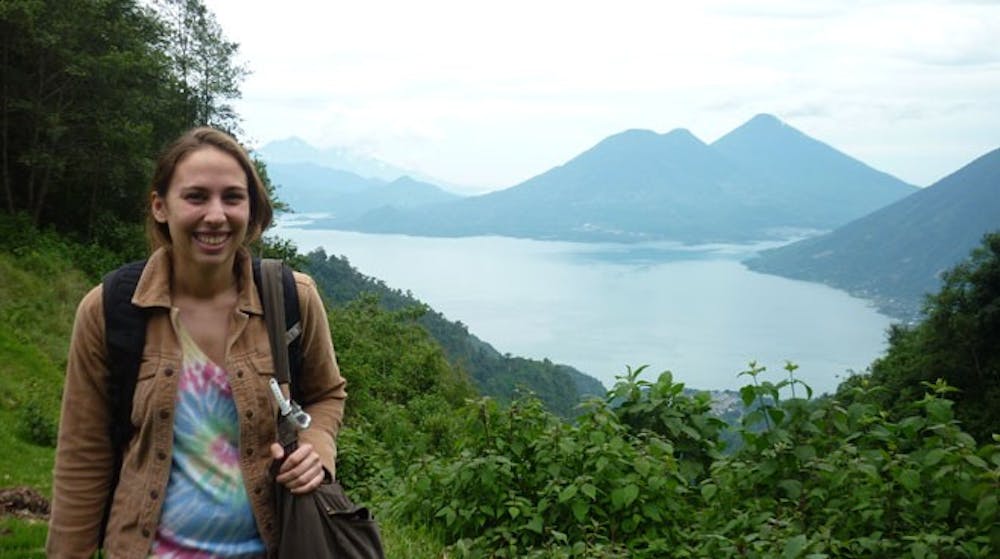When Julie Stevenson arrived in Quetzaltenango, Guatemala, this past May, never having taken a single Spanish class, she had 12 weeks to help design and establish a new accounting system for Asociacion de Mujeres del Altiplano (AMA), a non-governmental organization whose members didn't speak English.
Three months later, Stevenson, a senior, said she had completed her task and had even been able to act as a translator for service groups from the United States that had come to work with the organization.
Stevenson said she had taken Spanish classes during the first six weeks of her stay, and by the third or fourth week she was able to talk to everyone at her internship without a translator.
Stevenson got her first taste of Guatemala during the spring of her sophomore year, she said, when she went on a spring break trip sponsored by the University of Richmond and organized by the Highland Support Project (HSP), a non-profit based in Richmond that works with AMA and other Mayan communities in Guatemala.
"One of the reasons I really wanted to go to Guatemala and live and work abroad was to learn about other cultures," Stevenson said. "With this experience this summer I got a great chance to learn from the women I was working with in AMA and the families in the indigenous communities that welcomed us into their homes."
Stevenson isn't alone in her decision to return to Guatemala, said Ben Blevins, a Richmond graduate who founded HSP in 1992 with his now wife, Guadalupe Blevins.
"From the spring break trips, 80 percent of students come back to Guatemala within a year or two," he said. "Julie was a student who was very motivated to return.
"She is personable, and she wears her heart on her sleeve. This makes her highly functional in Guatemala. The people there can immediately tell who is friendly and kind, and Julie is one of those people."
Blevins said that when students take on internships in Guatemala through HSP, their internships involve work that is specifically tailored to who they are and what they are good at.
"We design internships around the interests and talents of an intern," he said, "and we make sure that the task at hand is based on achievable goals, and that what comes out of it will be something that the Mayans need."
Both Stevenson and Blevins said one of the most important themes behind HSP was the act of empowerment, by which people can empower other people to change their world by providing them with the knowledge, tools and resources to do so.
"With Julie's internship, it would have been easier to do it all herself," Blevins said. "It's more difficult and time-consuming to work with the people because it includes an educational component and a real dialogue in the process."
Enjoy what you're reading?
Signup for our newsletter
But this was all part of HSP's methodology, he said.
Stevenson said that when she had begun her internship with Claudia Ramirez, the head of AMA, her first task was to learn all about Guatemala's accounting system, and more specifically, AMA's.
Once that was accomplished, she said, she and Ramirez were able to decide together what needed to be improved about AMA's current accounting system.
"We saw where there were gaps, and what could be improved," she said. "We designed a program and then took it to a company that could create the software. And all this was happening in Spanish, so it was 20 times harder."
The program they created, Stevenson said, was a lot like QuickBooks, a program that helps people record their accounting.
"It's an informal way to keep track," she said. "A big goal behind everything was that AMA relies on money from donors, so they wanted to be able to show the donors where their money is going."
Stevenson said that she hoped to return to Guatemala someday to be reunited with the people she met this summer.
"I became really close with my host family," she said. "They would turn on the music as soon as they woke up, so there would be salsa music or another type of Latin American music playing in the house all day long. That's one of the things I miss the most."
In Stevenson's first two weeks in Guatemala, she said, there was a volcanic eruption, a hurricane and a 65-foot wide sinkhole that emerged in the middle of Guatemala City. The country was basically in a state of emergency, she said, but everyone reacted calmly and efficiently.
"People helped each other," she said. "They came together, digging mud out of houses in order to make everything exactly as it was before. It's not a selfish culture, it's a community-based, helping culture."
Blevins, who spends about half of each year traveling back and forth between Guatemala and the United States, said that one of the things he loved most about the Guatemalans was their good vibes.
"The people in Guatemala have a lot of love," he said. "So, some people go there and they really find something there. Going to Guatemala is like finding a treasure or eating a good pecan pie -- you just want to go back for more."
Contact staff writer Eliza Morse at eliza.morse@richmond.edu
Support independent student media
You can make a tax-deductible donation by clicking the button below, which takes you to our secure PayPal account. The page is set up to receive contributions in whatever amount you designate. We look forward to using the money we raise to further our mission of providing honest and accurate information to students, faculty, staff, alumni and others in the general public.
Donate Now



